



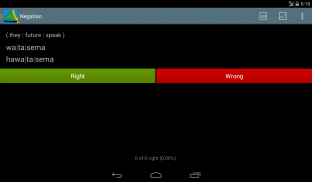

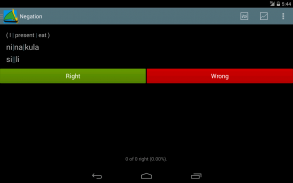
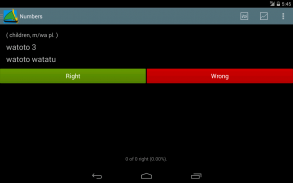
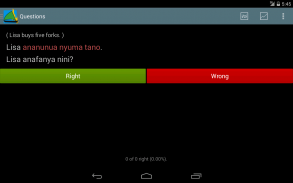
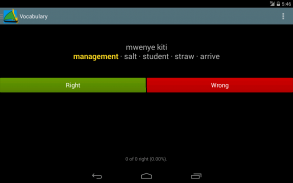
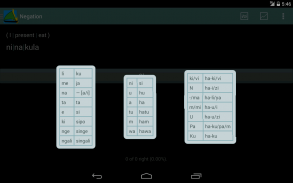
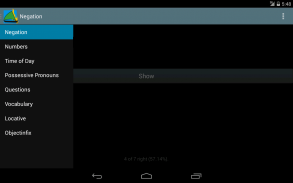
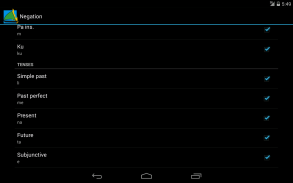
Mazoezi ya Kiswahili

Descrição do Mazoezi ya Kiswahili
... and numbers, and Swahili time, and questions, and some vocabulary.
Swahili courses teach grammar rules, e.g., negation in different tenses, the construction of numbers, swahili time, possessive pronouns, and questions. Knowing the rules is one thing, being really fluent in, e.g., Swahili negation is something different.
<b>Mazoezi ya Kiswahili</b> addresses the latter. That is, <b>Mazoezi ya Kiswahili</b> is for people who know the rules and want to practice their application.
The principle of practicing with <b>Mazoezi ya Kiswahili</b> is as follows: the app poses a task, say in the area of negation, by giving the positive case, e.g. <i>ninakula</i>. The task is to negate this phrase. Once you made up your solution in your mind, you press the <b>Show</b> button and <b>Mazoezi ya Kiswahili</b> displays the correct negation, <i>sili</i> in this case. If the solution you had in mind was right, go ahead and press <b>Right</b>, otherwise press <b>Wrong</b>, and a new task will be posed. Telling <b>Mazoezi ya Kiswahili</b> whether you were right or wrong allows the app to re-pose tasks on which you weren't right again; in addition it can keep statistics which may help you to understand which classes or tenses you do fine and which classes and tenses need more practice.
Currently, tasks from the following areas are offered:
• negation (all classes, tenses li/me/na/ta/e/ki/nge/ngali/hu)
• numbers (ordinal, with nouns, cardinal)
• Swahili time
• possessive pronouns (all classes, angu/ako/ake/etu/enu/ao)
• questions (nani, -a nani, -je, ..., -a ngapi)
• vocabulary (over 1000 words, both directions supported)
• locative (all classes, -ko/-po-/-mo)
• object infix (all classes)
<b>Mazoezi ya Kiswahili</b> is highly configurable to suit your needs and learning level:
• for each area, each class and case can individually be enabled or disabled; i.e. you may only practice negation for m/wa class in tenses li/me/na/ta
• for many areas there's a "cheat sheet" available showing the rules
• for many areas there's a detailed statistics sheet
• the translation shown in the top line can be disabled
• statistics via <b>Right</b>/<b>Wrong</b> buttons can be disabled
• show correct answer after timeout instead of waiting for <b>Show</b> press
If you spot any mistake, or if you've got suggestions for new areas (I want to add at least amba- and friends some time in the future) don't hesitate to contact me via the mail address given below.
And - as all app developers, I guess - I appreciate positive ratings and comments.
<b>Note</b>: the app <b>Mazoezi ya Kiswahili</b> is explicitly <i>privacy friendly</i> and <i>resource friendly</i>. It doesn't require any additional permissions, it doesn't spy on your contacts, and the app works fully offline, i.e. it doesn't collect any user data at all.
PS: The Play Store statistics tells me that I have users from Tanzania, Kenya, and Burundi - karibu <b>Mazoezi ya Kiswahili</b>! Who are you, what are you using the app for...? ;-)
</div> <div jsname="WJz9Hc" style="display:none">... E números, e tempo Swahili, e perguntas, e algum vocabulário.
Cursos Swahili ensinar as regras gramaticais, por exemplo, a negação em diferentes tempos, a construção de números, hora swahili, pronomes possessivos, e perguntas. Conhecer as regras é uma coisa, ser realmente fluente em, por exemplo, Swahili negação é algo diferente.
<b> Mazoezi ya Kiswahili aborda o último. Ou seja, <b> Mazoezi ya Kiswahili é para pessoas que conhecem as regras e querem praticar o seu pedido.
O princípio de praticar com <b> Mazoezi ya Kiswahili é a seguinte: o app coloca uma tarefa, digamos, na área da negação, dando o caso positivo, por exemplo, <i> ninakula . A tarefa é negar essa frase. Uma vez que você fez a sua solução em sua mente, você pressiona o <b> Mostrar o botão e <b> Mazoezi ya Kiswahili exibe a negação correta, <i> sili neste caso. Se a solução que você tinha em mente era certo, vá em frente e pressione <b> direito , caso contrário, pressione <b> Errado , e uma nova tarefa será colocada. Dizendo <b> Mazoezi ya Kiswahili se você estava certo ou errado permite que o aplicativo para re-colocar tarefas em que você não estava bem de novo; Além disso, pode manter estatísticas que podem ajudar você a entender quais classes ou tempos você faz aulas finos e que e tempos precisa de mais prática.
Atualmente, são oferecidas tarefas das seguintes áreas:
& Bull; negação (todas as classes, tensiona li / me / na / ta / e / ki / ESL / ngali / hu)
& Bull; números (ordinal, com substantivos, cardinal)
& Bull; Tempo Swahili
& Bull; pronomes possessivos (todas as classes, angu / ako / ake / etu / enu / AO)
& Bull; perguntas (nani, -a nani, -je, ..., -a ngapi)
& Bull; vocabulário (mais de 1000 palavras, ambos os sentidos suportado)
& Bull; locativo (todas as classes, -ko / -PO - / - mo)
& Bull; objeto infixo (todas as classes)
<b> Mazoezi ya Kiswahili é altamente configurável para atender às suas necessidades e nível de aprendizagem:
& Bull; para cada área, cada classe e caso pode individualmente ser ativado ou desativado; ou seja, você só pode praticar negação para a classe m / wa em tempos li / me / na / ta
& Bull; para muitas áreas há uma "cola" disponível mostrando as regras
& Bull; para muitas áreas há uma folha de estatísticas detalhadas
& Bull; a tradução mostrado na linha superior pode ser desativado
& Bull; estatísticas através <b> direito / <b> Errado botões pode ser desativado
& Bull; mostrar resposta correta após o tempo limite, em vez de esperar por <b> Mostrar imprensa
Se você encontrar algum erro, ou se você tem sugestões para novas áreas (Eu quero adicionar pelo menos amba- e amigos em algum momento no futuro), não hesite em contactar-me através do endereço de e-mail dado abaixo.
E - como todos os desenvolvedores de aplicativos, eu acho - eu aprecio classificações positivas e comentários.
<b> Nota : o aplicativo <b> Mazoezi ya Kiswahili é explicitamente <i> privacidade amigável e <i> recurso amigável . Ele não requer quaisquer permissões adicionais, não espionar seus contatos, e o aplicativo funciona totalmente off-line, ou seja, não recolher todos os dados do usuário em tudo.
PS: Os Play Store estatísticas me diz que eu tenho os usuários de Tanzânia, Quênia e Burundi - karibu <b> Mazoezi ya Kiswahili ! Quem é você, o que você está usando o app para ...? ;-)</b>
</i></i></b></b>
</b></b></b>
</b>
</b></b></b></i></b></b></i></b>
</b></b></div> <div class="show-more-end">





















